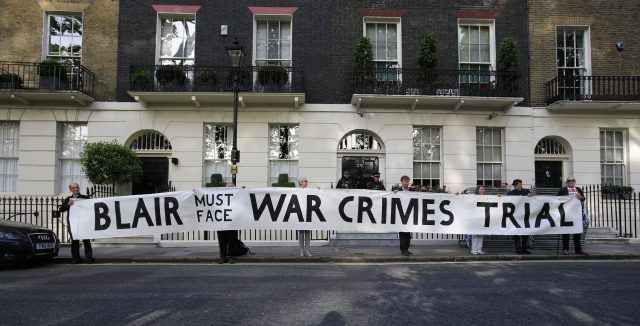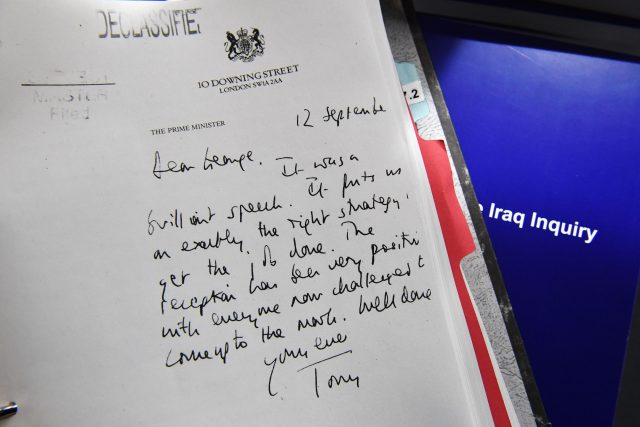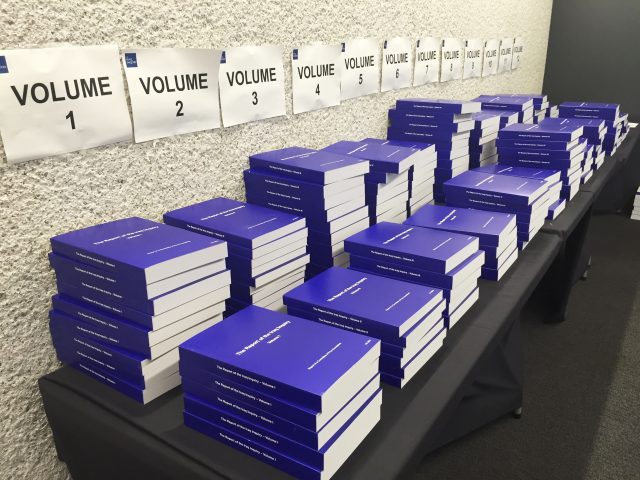
The High Court has blocked a bid by a former chief of staff of the Iraqi army to bring a private prosecution against Tony Blair over the Iraq War.
General Abdul Wahed Shannan Al Rabbat has accused Mr Blair, while UK prime minister, of committing a “crime of aggression” by invading Iraq in 2003 to overthrow President Saddam Hussein.
The general wanted to prosecute Mr Blair and two other key ministers at the time – foreign secretary Jack Straw and attorney general Lord Goldsmith.
 Protesters hold a banner outside the London home of Mr Blair (PA)
Protesters hold a banner outside the London home of Mr Blair (PA)
His lawyers asked London’s High Court for permission to seek judicial review in an attempt to get the Supreme Court, now the highest court in the land, to overturn a ruling by the House of Lords in 2006 that there is no such crime as the crime of aggression under the law of England and Wales.
Lord Thomas of Cwmgiedd, the Lord Chief Justice, and Mr Justice Ouseley dismissed the general’s application, saying there was “no prospect” of the case succeeding.
The case was brought after Westminster Magistrates’ Court refused to issue summonses in November last year on the grounds that the ex-ministers had immunity from legal action, and in any event the current Attorney General, Jeremy Wright QC, would have to give consent.
The general lives in Muscat, Oman, does not possess a passport and cannot travel to the UK.
 Detail of a declassified handwritten letter sent by Tony Blair to George Bush (PA)
Detail of a declassified handwritten letter sent by Tony Blair to George Bush (PA)
The UK was part of the coalition led by the US which invaded Iraq after American president George W Bush and Mr Blair accused Saddam of possessing weapons of mass destruction and having links to terrorists.
Michael Mansfield QC, appearing for General Al Rabbat, said at a recent one-day hearing that the inquiry into the invasion conducted by Sir John Chilcot, which concluded with a report published in July last year, justified the prosecution of Mr Blair.
Mr Mansfield said the main findings were contained in a paragraph early in the 12-volume report and could be summarised as concluding that Saddam did not pose an urgent threat to the interests of the UK, and the intelligence regarding weapons of mass destruction had been presented with “unwarranted certainty”.
It also concluded that peaceful alternatives to war had not been exhausted and that the war in Iraq was not necessary.
 The long-awaited Chilcot report was published in 2016 (PA)
The long-awaited Chilcot report was published in 2016 (PA)
Mr Mansfield argued that the international crime of a war of aggression had been accepted by then UK attorney general Sir Hartley Shawcross QC in the 1940s, at the time of the Nuremberg trials of Nazi war crimes.
The QC contended that, as the international community had held those responsible for the Second World War to account by prosecuting those thought responsible for aggression at Nuremberg, it was the duty of the UK courts to follow that example in relation to the Iraq War.
The House of Lords decided in the 2006 case of “R v Jones”, which also concerned the Iraq War, that although there was a crime of aggression under customary international law, there was no such crime under English law.
Mr Mansfield argued that the Jones case was wrongly decided and permission should be given to allow General Al Rabbat to re-argue the issue before the Supreme Court.
But the High Court ruled: “In our opinion there is no prospect of the Supreme Court holding that the decision in Jones was wrong or the reasoning no longer applicable.”


Why are you making commenting on The Herald only available to subscribers?
It should have been a safe space for informed debate, somewhere for readers to discuss issues around the biggest stories of the day, but all too often the below the line comments on most websites have become bogged down by off-topic discussions and abuse.
heraldscotland.com is tackling this problem by allowing only subscribers to comment.
We are doing this to improve the experience for our loyal readers and we believe it will reduce the ability of trolls and troublemakers, who occasionally find their way onto our site, to abuse our journalists and readers. We also hope it will help the comments section fulfil its promise as a part of Scotland's conversation with itself.
We are lucky at The Herald. We are read by an informed, educated readership who can add their knowledge and insights to our stories.
That is invaluable.
We are making the subscriber-only change to support our valued readers, who tell us they don't want the site cluttered up with irrelevant comments, untruths and abuse.
In the past, the journalist’s job was to collect and distribute information to the audience. Technology means that readers can shape a discussion. We look forward to hearing from you on heraldscotland.com
Comments & Moderation
Readers’ comments: You are personally liable for the content of any comments you upload to this website, so please act responsibly. We do not pre-moderate or monitor readers’ comments appearing on our websites, but we do post-moderate in response to complaints we receive or otherwise when a potential problem comes to our attention. You can make a complaint by using the ‘report this post’ link . We may then apply our discretion under the user terms to amend or delete comments.
Post moderation is undertaken full-time 9am-6pm on weekdays, and on a part-time basis outwith those hours.
Read the rules hereLast Updated:
Report this comment Cancel